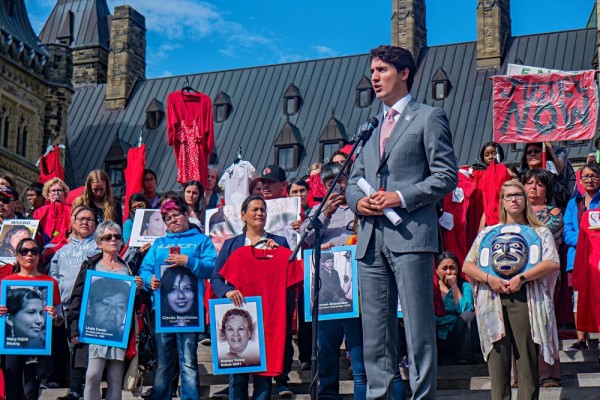On voting, roads, and prairie privilege
The last century and a half has seen an epic upheaval in the way we regard, share and use the land and its resources

Andrew Scheer visits rural dairy farmers in La Baie, Québec. Photo from Twitter.
During the televised debates last week Andrew Scheer and Justin Trudeau promised tax cuts that would cost the nation billions of dollars, draining its capacity to deal with the realities of climate change and the need to equitably fund Indigenous child welfare.
In rural Saskatchewan, where those concerns are drowned in outrage over delayed pipelines and the carbon tax, the promise of less government and lower taxation plays particularly well. Ten out of the province’s 14 seats are expected to go Conservative and people are hoping to elect the first home-grown prime minister since John Diefenbaker.
Once upon a time, when there were 21 federal seats in the province (in the 1945 federal election), 18 of them went to agrarian socialist MPs running for the Cooperative Commonwealth Federation (CCF), the long-lost ancestor of today’s NDP. That was a lifetime ago, but for those of us who have lived long enough to witness that communitarian base dwindle and give way to the kind of neoliberal populism seen in the American West, the shift in rural values is a sociological puzzle that gets stranger each time we head to the polling station.
From the clearing of the plains under colonial federal policy to the National Resource Transfer Agreement in 1930 to the current culture of private property entitlement that endorsed the acquittal of a farmer charged with shooting a young Indigenous man, the last century and a half has seen an epic upheaval in the way we regard, share and use the land and its resources.
Indigenous peoples, once fully immersed in the biological reality of dependence on one another and shared resources, and settlers who for generations balanced private interests with strong cooperative values, now find themselves surrounded by or addicted to an extractivist culture based on the rarefied and embattled fantasy of the self-made man on his private estate.
This delusion has been brought by hydrocarbons. Today, with enough diesel, a single person can bulldoze woodlands, level hills, change the course of streams; their conscience sustained and excesses justified by the belief that they are doing it to feed the world.
The rural-urban divide widens with each election and few on either side recognize the depth of settler privilege and fossil fuel dependency that spans the gap. If you ask city dwellers why rural people vote so consistently today for tax cuts, privatization, and de-regulation, they will usually chalk it up to education. They stop short of saying “because farmers are stupid” but the insult is couched in references to the failure of our schools or the shortage of university degrees in rural communities.
If you ask rural people the same question, why they vote for less government, they say things like: “In the city, when you have a problem, you get on the phone and look for someone to fix it for you. Out here, we do it ourselves.” They have created their wealth and wellbeing out of thin air, honest work and ingenuity, and they don’t want government telling them what they can and cannot do on their land, or taxing the hard-won earnings that come from all that do-it-yourself effort.
There is something undeniably compelling about the myth of the hard-working settler, and the fantasy of independence and ex nihilo wealth it upholds. Life would be so much simpler if it were true, if in fact First Nations had freely handed the prairies over to the Crown to be parcelled out—here, we don’t need it. But even if our prosperity had nothing to do with the privilege passed on to us by our homesteading ancestors receiving free land, everyone in the prairie provinces (including our self-made farmer-millionaires) would remain utterly dependent upon government programs, subsidies, and regulations that work in our favour.
Here is one example of a hidden but vital subsidy supporting our carbon-intensive rural commonwealth. Saskatchewan, one of the most sparsely populated provinces in Canada, has by far the most road surface at 190,000 kilometres. The provincial government’s Economic Overview Brochure boasts that we have enough roads to circle the planet four times (and 2,400 trucking companies travelling it), all built and maintained by local and provincial governments, often taking advantage of federal infrastructure funding. In fact, a new program is delivering $896 million in federal funding over the next decade for Saskatchewan infrastructure projects, emphasizing “faster commutes and travel times and easier movement of goods for businesses; and better transportation… for people living in rural communities.”
A voter miles from any city watching the election debate, weighing one neoliberal tax cut promise against another as he sits in a warm, well-lit home eating cheese snacks constructed of food-related substances from faraway lands, might in a parallel universe make for an impressive display of independence. Yet, in this one, where the laws of thermodynamics persist, the scene testifies to work done by taxes and a mixed bag of government policy. Mixed because, while some of it brought vital services and public goods—from rural electrification to broadband and mobile phone networks, publicly funded health care, and a provincial bus service (recently dismantled)—the balance of expenditure has usually privileged settler populations and communities over and above the wellbeing of Indigenous people, who meanwhile represent the fastest growing population in Canada.
The lowest moment in last week’s election debate came when Trudeau and Scheer were asked to debate “Indigenous issues” and they began yelling at one another, each claiming to be the only one who can build pipelines. They failed to even address, however, the gross injustices faced by the nations whose ancestors did not need roads or fossil fuels to live well in this land for thousands of years.
No one can say what it would take to shift the weight of government expenditure toward a future where, instead of pipelines and extractive industries, we fund education and child welfare for all Canadians and harness the economy towards a climate change Marshall Plan, but we can be certain that tax cuts and less government will not get us there.
Trevor Herriot is a Regina-based naturalist and writer.










